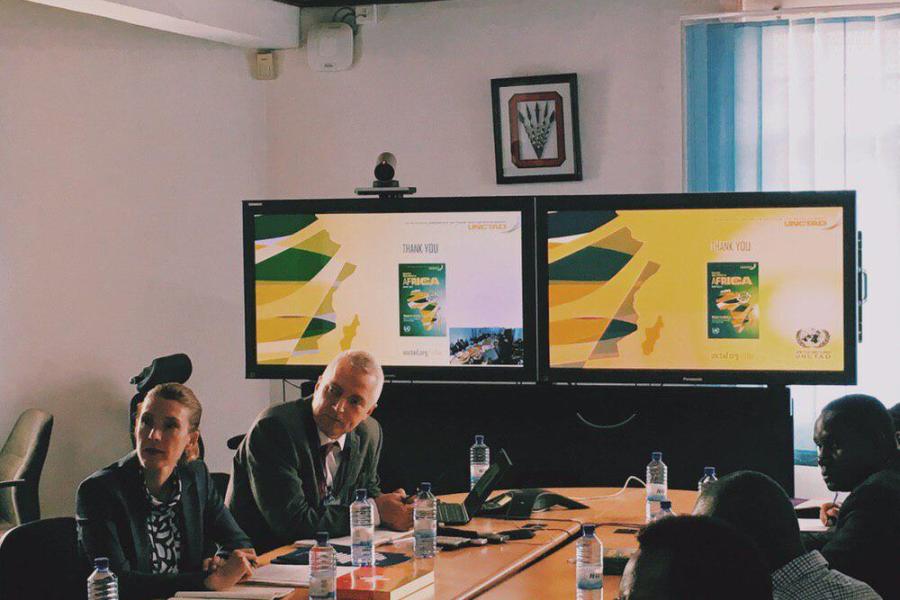Rules of Origin have the potential to ‘make-or-break’ the effectiveness of AfCFTA – UN Report
02 July 2019
- One UN Rwanda organised a policy dialogue to discuss the newly-released UNCTAD Economic Development in Africa Report 2019, which notes that, within the context of the current negotiations on the implementation of the African Continental Free Trade Area (AfCFTA), rules of origin could be a game changer for the continent - as long as they are simple, transparent and business-friendly.
- The event was held on 26 June 2019 at the UN Economic Commission for Africa (ECA), office for Eastern Africa in Kigali, Rwanda.
KIGALI, RWANDA 29 JUN 2019 - One UN Rwanda organised a policy dialogue to discuss the newly-released UNCTAD Economic Development in Africa Report 2019, which notes that, within the context of the current negotiations on the implementation of the African Continental Free Trade Area (AfCFTA), rules of origin could be a game changer for the continent, as long as they are simple, transparent and business-friendly. The event was held on 26 June 2019 at the UN Economic Commission for Africa (ECA), office for Eastern Africa in Kigali, Rwanda.
Released on Wednesday by the UN Conference on Trade and Development (UNCTAD), the Economic Development in Africa Report 2019 argues that rules of origin – the criteria used to determine the ultimate nationality of a product – will be a major determinant of the effectiveness of the African Continental Free Trade Area (AfCFTA) that came into force in May.
The policy dialogue kicked off with remarks from Andrew Mold, Acting Director of ECA, Office for Eastern Africa – who clarified the AfCFTA’s current status. “The number of ratifications now is 24 and officially the AfCFTA came into force in May 2019”, he said. Mold stressed that the AfCFTA is not a simple trade agreement. He explained the ambitious nature of the AfCFTA, saying that “the agreement encompasses ambitions to proceed to a single unified customs union and includes protocols on cross-border investment, intellectual property and competition policy.”

The Economic Development in Africa Report 2019, entitled Made in Africa: Rules of origin for enhanced intra-African trade, was presented by Claudia Roethlisberger, an Economic Affairs Officer for UNCTAD. The meeting participants discussed at length the nature of Rules of Origin, which constitute ‘a passport for goods circulating under any preferential trading regime’.
Roethlisberger said that compared with Africa’s exports to other parts of the world, intra-African trade is much more centered around manufactured goods, with higher levels of product complexity. This tends to contribute to higher incomes and faster economic growth over the long-run.
UNCTAD estimates that intra-African exports were just 16.6 per cent of total exports in 2017, compared with 68.1 per cent of intra-regional in Europe. The report notes, however, that the AfCFTA is expected to boost intra-African trade by around a third once full tariff liberalization is implemented, attracting additional intra-African investments and creating new market opportunities to foster Africa’s industrialization:
“By supporting intra-African trade, the AfCFTA will advance Africa’s industrialization agenda, through regional value-chain development; it will also reduce Africa’s dependence on commodities and generate the jobs needed to harness Africa’s demographic dividend,”
said Roethlisberger.
While rules of origin are necessary instruments within any regional block, how they are addressed by the AfCFTA will directly affect the size and distribution of economic benefits among member countries, the report argues. In his closing remarks, Mold emphasized the importance of moving forward rapidly with the implementation of the AfCFTA:
“On the margins, East Africa is producing a lot of diversified goods – such as furniture, processed foods, and textiles. However, we are still too dependent on imports from outside the continent. This means there is enormous potential for increased production within the region. If you want to change the structure of trade and production, then you do it progressively. And you achieve that gradually through promoting intra-African component of trade much more aggressively than has been done in the past. This is one of the reasons why ECA and the UN system in general is so supportive of the AfCFTA.”
Notes for Editors:
- The event took place on Wednesday 26 June 2019, 9:30-11.30 at the Office for Eastern Africa of UN Economic Commission for Africa (ECA) in Kigali.
- The full report is available here.
- A press release on the continental report is available on our website, here.
- The recent video, referred to in the quote from Mr. Mold, is also available on our website, here










